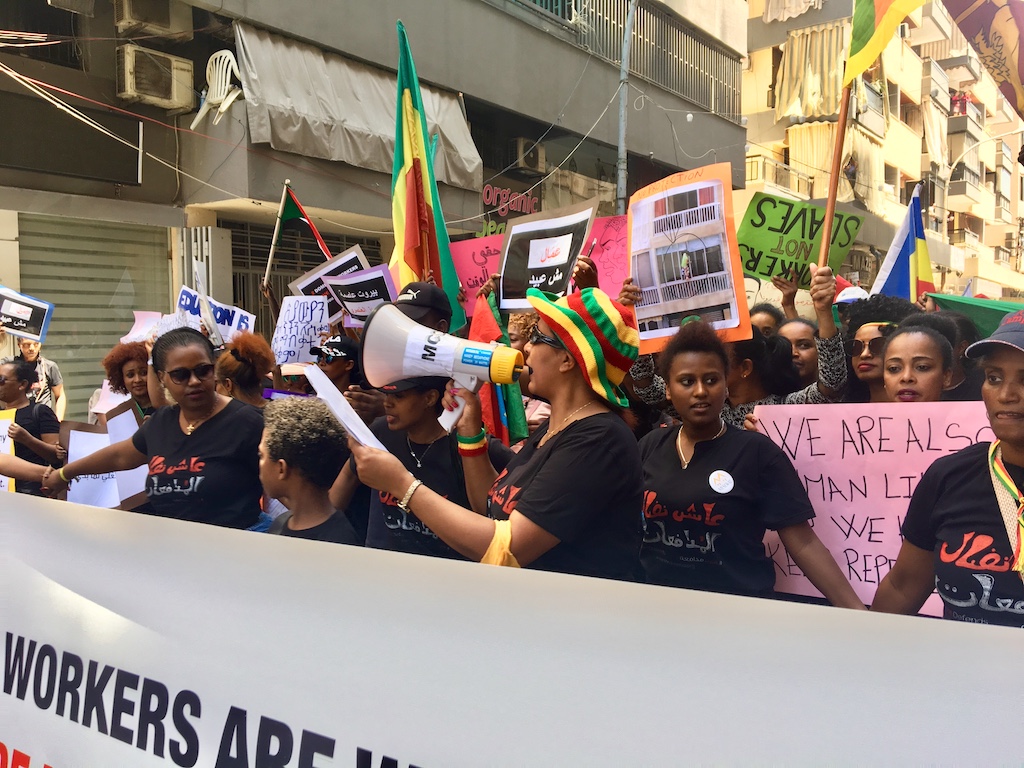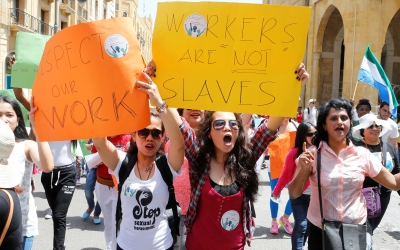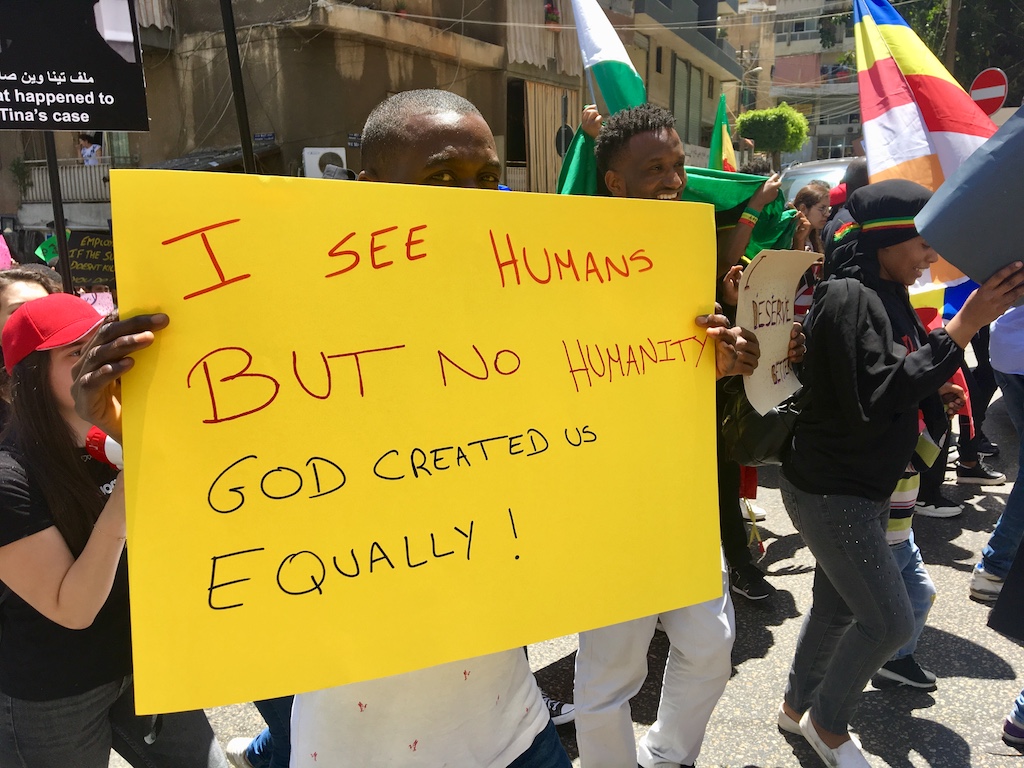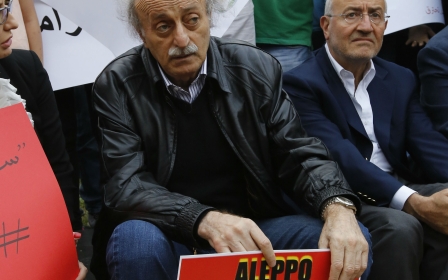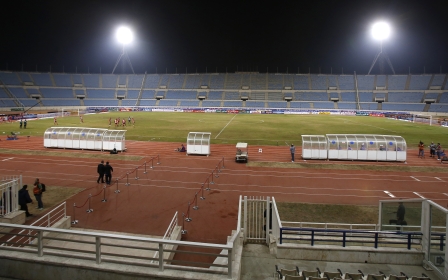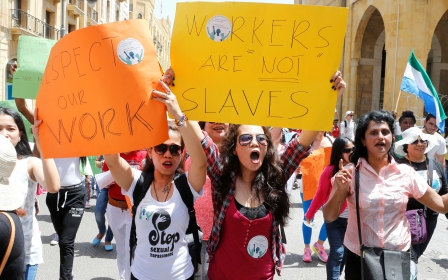'Our lives matter': Lebanon’s migrant workers fight for their rights
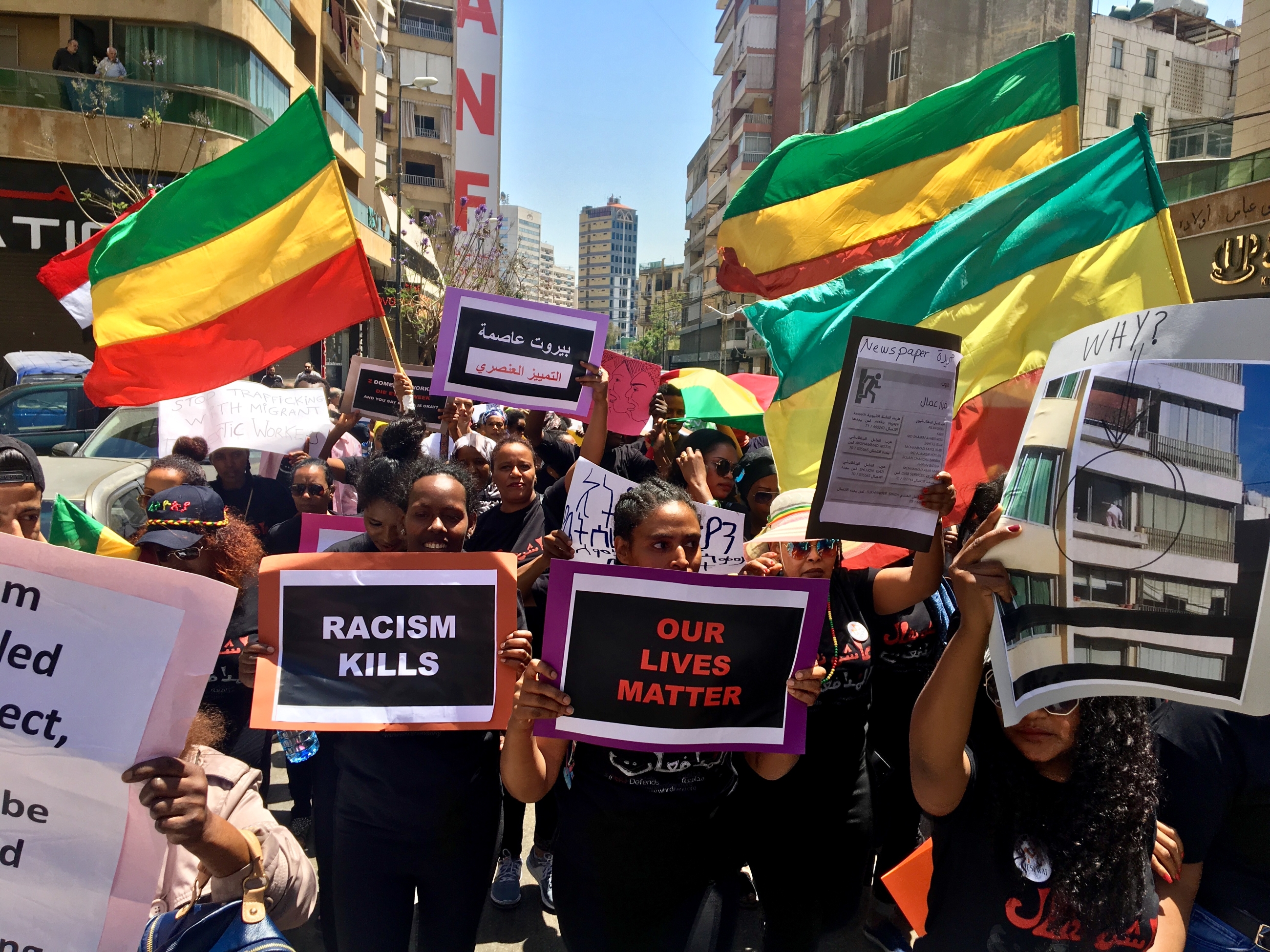
Rani left war-torn Sri Lanka 27 years ago, after a recruitment agency said they would find her work in Beirut.
“The agency told me that they would provide me a job with good conditions,” she said.
That all changed upon her arrival in Lebanon. Rami, who had once worked in the public sector in Sri Lanka, found herself and 12 others contracted to different employers every day, and left to sleep on the floor.
“We had nothing and couldn’t sleep,” Rani added. “All we had were some biscuits and tap water to drink.”
Something changed for her, though. After visiting the Migrant Community Centre, Rani became involved with migrant worker-led activism, seeking to fight for better conditions alongside her peers.
New MEE newsletter: Jerusalem Dispatch
Sign up to get the latest insights and analysis on Israel-Palestine, alongside Turkey Unpacked and other MEE newsletters
There are over 250,000 migrant domestic workers in Lebanon, and many have taken the lead in grassroots activism against a system known as kafala, or "sponsorship". Under this system, separate from the labour code, migrant workers are left at the mercy of their sponsor - a system which activists say is rife with abuse.
It was estimated in 2017 that at least two migrant domestic workers died every week, due to suicide or failed escape attempts.
These grassroots movements routinely document cases of verbal, physical, and sexual abuse, and other exploitative practices, notably confiscating passports and not paying salaries. Human rights organisations continue to corroborate and amplify the information.
Despite many risks, Lebanon’s migrant workers have managed to organise and mobilise tenaciously, effectively becoming part of Lebanon’s overarching civil society.
Different stories, same struggle
“You learn about the place you live in from a totally different perspective,” Executive Director of the Anti-Racism Movement Farah Salka told Middle East Eye.
A decade ago, feminist groups in Lebanon started reaching out to vulnerable and disenfranchised communities.
“I started meeting migrant workers… and developed networks and friendships," explained Salka.
Salka and her allies made their breakthrough in 2012, after videotaping an Ethiopian woman being refused entry to a Beirut beach, sparking a heated national discussion about racism.
Campaigns aside, the Anti-Racism Movement’s landmark project is the Migrant Community Center, inspired by migrant workers Salka met in 2009 who told her that they would like “a space of [their] own”. It’s now a space for discussions, language classes, and community building for many migrant workers - including Rani and others.
Rahel moved to Lebanon 18 years ago from Ethiopia and has been a domestic worker since with different households. Among her employers was one who hit and underfed her.
“I was hungry,” Rahel told MEE.
She first met Salka nine years ago, and asked her if she could help turn a script she wrote into a film or play.
“I’m now involved in theatre and in bringing women together,” she says proudly. “We have to let people know we deserve our rights.”
In 2013, while producing a play about a migrant domestic worker in Lebanon, Rahel met Samy, a fellow Ethiopian citizen.
“She was searching for an Ethiopian man who could act as an Ethiopian consular,” he told Middle East Eye. “I decided to join… because of the abuse Ethiopian migrant domestic workers face in Lebanon.”
Samy has been living in Lebanon for eight years, though his activism started after meeting Rahel. He felt that he needed to support the community, and seek justice for his deceased sister, who he said was a victim of kafala.
“I felt bad, knowing that I am in Lebanon and I wasn’t doing anything to help," he said.
One man who has made waves recently is Dipendra, a Nepalese worker who now resides in Canada. His platform, This Is Lebanon, names and shames individuals who have abused migrant workers to the extent that the website was recently blocked following a court order.
Abused, imprisoned, and tortured after moving to Lebanon in 1998 at 18, Dipendra later supported migrant detainees.
“My passport was immediately confiscated by my sponsor; I was deceived,” he told MEE. Trying to flee without any documents, he was detained, and recalled an incident where he had to sign a pledge in Arabic, a language that he could speak but not read.
“When I refused…I was beaten by the interrogator. I met many people like myself [in prison],” he said. “I found many migrant workers who were innocent."
Released six months later after a local church found him a sponsor, he started volunteering with Lebanon’s Nepalese community. “I was appointed diplomatic status in July 2006,” he said, recalling the situation with a sigh of relief.
“I would volunteer at the consulate as an honorary representative.”
Dipendra still receives threatening messages because of his work, showing MEE screenshots from different platforms, some claiming to represent Lebanese security agencies.
State backlash
The migrant worker movement has taken on increased visibility in Lebanon, not only online, but in the streets.
Hundreds of migrant domestic workers and Lebanese protested on 5 May across Beirut to mark Labour Day, calling for an end to the kafala system.
The crowd chanted against the poor working conditions and abuse migrant workers frequently face. Ethiopian, Malagasy, Sri Lankan, and Sudanese flags were waved, while other protestors carried signs in Arabic, French, English, and Amharic. An Ethiopian man carried a sign depicting prison cell-like rooms that read, “I sleep here”.
As the march wound through residential areas, neighbours watched and filmed it. Among the spectators standing on balconies were migrant domestic workers who had not been given a day off that Sunday. The demonstrators cheered and waved at the women above, expressing their support and solidarity for those prevented from participating in the fight for their rights.
While the march earlier this month went smoothly, Lebanese authorities have not responded kindly to the mobilisation.
Some of the interviewed activists admit they face harassment online, especially after speaking to the press.
“Sometimes journalists will misinterpret what we say,” Rahel said, citing a case where a local daily misrepresented a statement, which led to a call from the authorities.
At the 2018 migrant domestic worker’s march, the Internal Security Forces arbitrarily arrested one of the protesting workers. She was soon released and the protest continued, though it was never known why she was briefly arrested in the first place.
Authorities continue to arbitrarily arrest migrant workers involved in activism. Samy said he has faced multiple arrests - not always even knowing where he was being held - and has been tortured once.
“My two eardrums were ruptured because of the torture,” he said. “I still don’t know why I was arrested.”
Many non-Lebanese nationals, migrant workers included, are held in the General Security Detention Centre, known for its poor incarceration conditions.
Migrant activists have even been deported. During a crackdown in early December 2016, Sujana Rana and Roja Limbu, from Nepal, were arrested. Despite holding valid legal documents and work authorisation, both were removed from the country that same month without any clear charges.
Human Rights Watch and others say that the arrest was related to their activism, and that Rana and Limbu were denied access to lawyers.
Kafala debate
Kafala has become a hot topic in the Lebanese mainstream media, though activists say they often find it sensationalist.
Coverage of migrant domestic workers’ deaths is relegated to half-hearted news shorts, often summarising police reports with little additional coverage.
The case of 21-year-old Lensa Lelisa in March 2018 changed everything.
In February, a video of her covered in bandages and casts went viral through This Is Lebanon. In the video, Lelisa says she jumped off the balcony trying to escape from her employer, high-end fashion designer Eleanore Ajami.
Covered across Lebanese media and reported by Human Rights Watch, Ajami immediately responded to the media, denied all allegations, and threatened to sue This Is Lebanon. She also released a film of Lelisa retracting her earlier claims. General Security forces eventually waded into the fray, stating that its investigation had not found that Lelisa was ever mistreated, and that she would return to Ethiopia.
Amnesty International has since published a report and campaign with harrowing testimonies from migrant domestic workers in Lebanon.
Political condemnation, but no abolition in sight
But attitudes seem to be changing, however slowly.
In February, newly appointed labour minister Camille Abousleiman openly condemned elements of the kafala system on social media.
“Withholding the passports of domestic workers in Lebanon is forbidden and illogical, and it is a shame that we are behaving in such an inhumane way,” he tweeted soon after taking his post.
This rhetoric is a far cry from predecessors such as Sejaan Azzi, who once threatened to use violent force if migrant workers held a press conference to announce a labour union.
Activists seemed pleased. “I don’t expect anything to change,” Salka said. “[But] the fact we have a minister who is ashamed about the situation is something to be happy about.”
Abousleiman recently formed a ministerial and NGO task force to discuss reforms. Amnesty Lebanon campaigner Diala Haidar said that the committee has met and is expected to present recommendations to the minister.
MEE understands that Human Rights Watch is one of the NGOs involved in the committee.
“Since His Excellency was appointed, [we said] the kafala system in Lebanon shows us in a negative light,” the Ministry of Labour told MEE.
But despite calling kafala “modern day slavery”, Abousleiman has made it clear that his interest is in reform - not abolition.
He told MEE that while the human rights of migrant domestic workers is a priority, he did not want to “financially harm” Lebanese sponsors who are not affluent.
While the outcome of the anti-kafala mobilisation remains uncertain, few expected migrant workers’ ongoing activism to gain such traction.
“It’s really exceptional,” Amnesty’s Haidar said. “They have really mobilised unlike anywhere else.”
Rahel, Rani, and Samy remained divided about the impact of the minister’s comments.
“We have more hope…because of the new minister,” Samy said.
Rani agreed with Samy, but Rahel remained sceptical - raising both eyebrows to say “no”.
Middle East Eye delivers independent and unrivalled coverage and analysis of the Middle East, North Africa and beyond. To learn more about republishing this content and the associated fees, please fill out this form. More about MEE can be found here.


